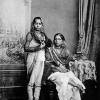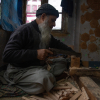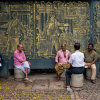A ‘credo’ implies that the writing must have a purpose beyond developing the personality and the ego of the writer. Literally meaning ‘I believe’, a credo is a statement of the writer’s faith and purpose. My credo is communication with people. There are two sides to this business of communication—the writer and the people with whom he is trying to communicate. So, it follows that the writing must be understood by the people—otherwise there is no communication. Understood—not necessarily appreciated or liked or praised! Otherwise we will come to the theory of the ‘Lowest common denominator of public-taste’ which will reduce all writing to the level of purple pages of the sex-and-violence bestsellers.
While I believe in communication, I also believe in what is to be communicated. This is the content of writing. The content must be purposeful, progressive. It must be rational and reasonable; it must be critical of all that is archaic and bad in our society and in the psyche of our people—the superstitions, the fanatical dogmas, the unreason and myopic clinging to the past. I believe that the writer must be in the advance guard of society and life. He must not only observe and see everything that goes on in life and society—he must foresee and warn his contemporaries where reaction is leading them—to the total destruction of their individual personality, and to social chaos. And, believe it or not, it is done in the name of Freedom. I believe in Man! Man, I believe, is the centre of the universe.
Culture is the finer aspect of Life—which helps Man to be changed by the social forces around him, and who changes these forces and who, in the course of so doing, changes himself. That is his destiny and his duty. And if he forgets it, the writer is there to remind him by portraying Man in his books—portraying his weakness as well as his strength, his meannesses as well as the greatness and the grandeur of his personality. For that not only should the writer be a Man, he must be a humanist—a believer in Man, a lover of Man, as well as a critic of Man and his pettiness and his selfishness.
What Ralph Fox says of the novel is equally true of all writing. In his essay, 'The Novel and the People', Fox writes:
The novel is the most important gift of … civilization to the world’s imaginative culture. The novel is its great adventure, its discovery of Man.
Much earlier than Ralph Fox, Pico della Mirandola imagined God or Nature addressing Man thus:
We have given you, Adam, neither a definite dwelling nor a specific face, and function… We have placed you in the centre of the world, in order that you may more easily look around you… so that you may mould and shape like a sculptor the form you prefer to give yourself. You can plunge into the lower ranks of the brutes or lift yourself into the higher ranks of divine beings.
This discovery—or the re-discovery—of Man as the central figure in the human drama is the whole purpose of literature and writing. This calls for a new realism and a new humanism, a new sense of responsibility of the writer which is sought to be perverted by the popular novel, the popular short story and the popular film which no longer depict man as 'an elemental force, a robust, cheerful or sad human creature—action is left to the criminal in the detective novels or films, or the monster in the horror stories, or the (dehumanized) strong he-man in the eternal triangle novels or film scenarios manufactured to feed the jaded appetites of tired and overworked men and bored housewives.'
The limits of this kind of literature have been reached in James Bond kind of novels or films where Bond always featured with a gun in one hand while the other hand is left free to fondle or caress a luscious female spy in the near-nude. So Bond makes love to the spy, then takes out his revolver to shoot her—all in Her Majesty’s Service, as he declares in one of his lurid melodramas.
I believe that the true writer must not only refrain from imitating this kind of literature, but must fight it and expose it for the anti-Man and anti-humanistic attitudes.
I believe that the function of literature is the revelation of man to himself—so to depict reality that Man, reading it, must recognize himself and in doing so, he must become aware of the possibilities of his own development into a better, less selfish, nobler human being. That, roughly, has been my credo—though this awareness of the function of literature came much later. When I wrote my first short story, ‘The Sparrows’, I was only intuitively a humanist. I only wanted to tell a story as effectively as possible. That this story was about a peasant, who was turned into a sadist by the cruel world and redeemed with the love of four sparrows as the symbol of the finer graces of life. Later on, I was told I had written a progressive short story and I joined the ranks of the ‘progressive writers’.
I wrote a hundred stories and a dozen novels including the 500-page autobiography Inqilab. But this remained the core of my writing—‘Man’, as Marx says somewhere, ‘is capable of making his own history’. I believe in Marxism not as a dogma but a philosophy, which treats Man as the central figure of the universe and explains the historical relationship of Man and Society. I believe that Man is the product of the social forces, but Man is also capable of changing those social forces. He is both the Son and the Father of Revolutions, which bring about cataclysmic changes in Society—and in human character and personal destiny.
I was primarily interested in the contemporary Social Reality—how Man was changing under the impact of the forces of the scientific phenomena, how a new Man—a new Indian—was evolving—part coward, part brave and dynamic, part superstitious and part a Rational creature; part Reactionary and part Progressive.
I believe in the working man—I believe that hard work ennobles Man, makes him more intelligent and re-moulds his mind. So my stories and novels were about working people—men and women-journalists, factory workers, and peasants like the Rahim Khan of my first story, ‘The Sparrows’.
The highbrow literary critics have sometimes sneeringly labelled my fiction (and even my novels, one of which—Inqilab—took me seven years to write) as ‘mere journalese’. Obviously the mere fact that some of them owe their inspiration to real-life incidents chronicled in the daily press is enough and sufficient to put my stories beyond the pale of literary creation.
Maybe I am an unredeemed journalist and columnist masquerading as a writer of fiction. But as I said in a ‘Foreword’ to an earlier collection of my short stories, I have always believed that while the inner life of men undoubtedly is, and should be, the primary concern of creative fiction, this inner, personal, subjective life is being daily influenced, moulded, transformed by external social forces. No man or woman is totally free from the impact of objective social reality.
This interaction of the individual and the social forces operating around him is of particular interest to me, and it has inspired, provoked, or coloured most of what I have written.
Arranged chronologically, the reader will find many fragments of our recent history—the war, the riots, the Partition, the post-Freedom years of disillusionment, and the new hope generated by the successive Five-Year Plans.
A few stories may provoke highbrow critics living in isolated ivory-towers to shout the dread word: ‘Propaganda’. But these stories are basically not about plans, projects, or policies of the Government. They are what they claim to be—about our contemporaries, people of a new India, and how their subjective ‘inner life’ (their moments of tenderness and passion, frustration and exultation) are inexorably being changed by the dynamics of life, in which the positive values of socialism and secularism are playing their own part.
(First published in Indian Literature, September–October, 1979)











